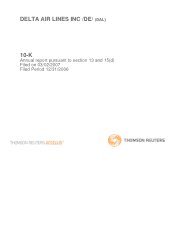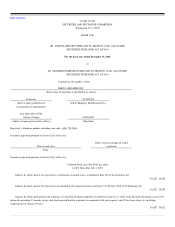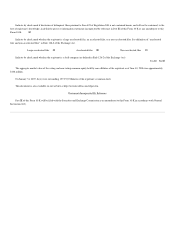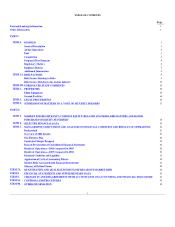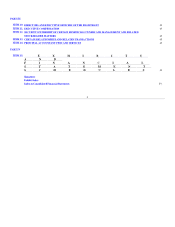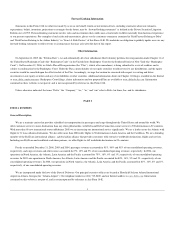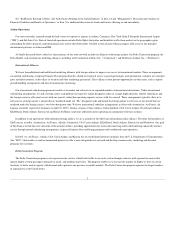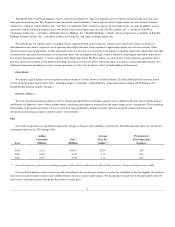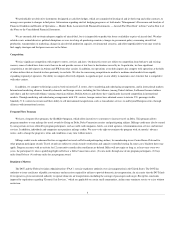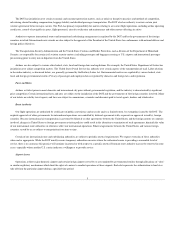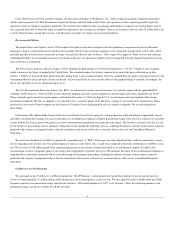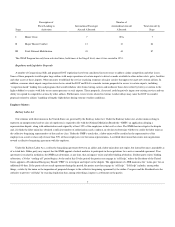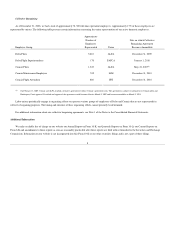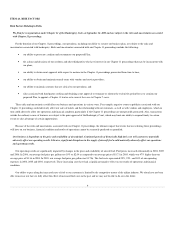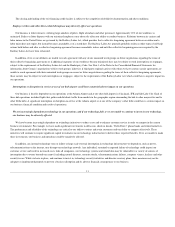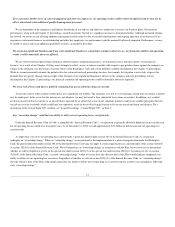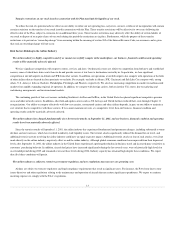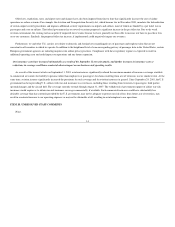Delta Airlines 2006 Annual Report Download - page 9
Download and view the complete annual report
Please find page 9 of the 2006 Delta Airlines annual report below. You can navigate through the pages in the report by either clicking on the pages listed below, or by using the keyword search tool below to find specific information within the annual report.
We periodically use derivative instruments designated as cash flow hedges, which are comprised of heating oil and jet fuel swap and collar contracts, to
manage our exposure to changes in fuel prices. Information regarding our fuel hedging program is set forth under “Management’s Discussion and Analysis of
Financial Condition and Results of Operations — Market Risks Associated with Financial Instruments — Aircraft Fuel Price Risk” in Item 7 and in Note 4 of
the Notes to the Consolidated Financial Statements.
We are currently able to obtain adequate supplies of aircraft fuel, but it is impossible to predict the future availability or price of aircraft fuel. Weather-
related events, natural disasters, political disruptions or wars involving oil-producing countries, changes in government policy concerning aircraft fuel
production, transportation or marketing, changes in aircraft fuel production capacity, environmental concerns, and other unpredictable events may result in
fuel supply shortages and fuel price increases in the future.
Competition
We face significant competition with respect to routes, services and fares. Our domestic routes are subject to competition from both new and existing
carriers, some of which have lower costs than we do and provide service at low fares to destinations served by us. In particular, we face significant
competition at our hub airports in Atlanta and JFK from other carriers. In addition, our operations at our hub airports also compete with operations at the hubs
of other airlines that are located in close proximity to our hubs. We also face increasing competition in smaller to medium-sized markets from rapidly
expanding regional jet operators. Our ability to compete effectively depends, in significant part, on our ability to maintain a cost structure that is competitive
with other carriers.
In addition, we compete with foreign carriers, both on interior U.S. routes, due to marketing and codesharing arrangements, and in international markets.
International marketing alliances formed by domestic and foreign carriers, including the Star Alliance (among United Airlines, Lufthansa German Airlines
and others) and the oneworld Alliance (among American Airlines, British Airways and others) have significantly increased competition in international
markets. Through marketing and codesharing arrangements with U.S. carriers, foreign carriers have obtained access to interior U.S. passenger traffic.
Similarly, U.S. carriers have increased their ability to sell international transportation, such as transatlantic services to and beyond European cities, through
alliances with international carriers.
Frequent Flyer Program
We have a frequent flyer program, the SkyMiles®program, which offers incentives to customers to increase travel on Delta. This program allows
program members to earn mileage for travel awards by flying on Delta, Delta Connection carriers and participating airlines. Mileage credit may also be earned
by using certain services offered by program participants, such as credit card companies, hotels, car rental agencies, telecommunication services and internet
services. In addition, individuals and companies may purchase mileage credits. We reserve the right to terminate the program with six months’ advance
notice, and to change the program’s terms and conditions at any time without notice.
Mileage credits can be redeemed for free or upgraded air travel on Delta and participating airlines, for membership in our Crown Room Club and for
other program participant awards. Travel awards are subject to certain transfer restrictions and capacity-controlled seating. In some cases, blackout dates may
apply. Program accounts with no activity for 12 consecutive months after enrollment are deleted. Miles will not expire so long as, at least once every two
years, the participant (1) takes a qualifying flight on Delta or a Delta Connection carrier, (2) earns miles through one of our program participants, (3) buys
miles from Delta or (4) redeems miles for any program award.
Regulatory Matters
The DOT and the Federal Aviation Administration (“FAA”) exercise regulatory authority over air transportation in the United States. The DOT has
authority to issue certificates of public convenience and necessity required for airlines to provide domestic air transportation. An air carrier that the DOT finds
fit to operate is given unrestricted authority to operate domestic air transportation (including the carriage of passengers and cargo). Except for constraints
imposed by regulations regarding “Essential Air Services,” which are applicable to certain small communities, airlines may terminate service to a city without
restriction.
4

